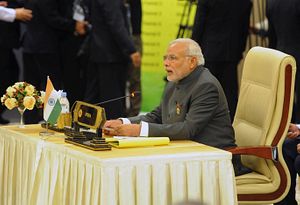The emergence of India as a growing global superpower over the last two decades is one of the most exciting — and potentially positive — moments of the 21st century. The world’s third largest economy has 600 million people under 25, is the world’s largest democracy, and will have the world’s largest population by 2050. It has more demographic potential than any other country.
The United States, Germany, France, China, and Japan are rapidly building their links with India, signing trade deals, defense pacts, and cultural partnerships. U.K. Prime Minister David Cameron has visited Delhi three times since 2010, but this month will see the first visit by an Indian prime minister to Britain in over a decade. Prime Minister Narendra Modi’s visit aims to strengthen economic and security ties and to reach out to the Indian diaspora to invest and engage more with India.
For the U.K., strengthening ties with one of the countries that will help shape the 21st century and is one of the world’s fastest growing economies is a priority. Yet a new British Council report, “India Matters,” shows a risk of a disconnect between the two countries. This risk must be addressed.
A newfound Indian confidence coincides with a lack of knowledge and understanding by young people in the U.K. of modern India and the opportunities it can offer. Our research demonstrated that young people in the U.K. need to know more about India and refresh their views of the country, reflecting its growing economic power and digital prowess.
At the launch of “India Matters” last week in London, one Indian guest pointed out that Modi has visited Facebook (in California) before the U.K. Far from being trivial, I think that’s a reflection of the future of international relations – and how Modi is ahead of others in understanding it.
Modi’s trip to London next week is therefore full of potential to kick start a new era of U.K.-India relations. Our countries have unique historic ties that none of India’s other partners can claim — but the U.K. cannot take this connection for granted. London needs to reinforce those connections, to future-proof our relationship or risk being left behind as India continues its remarkable trajectory. In particular, the U.K. and India’s educational and cultural links can unite our people for the long-term, regardless of fluctuations in financial markets or the votes in the ballot box.
So how can our two countries forge bonds for the future? A key to this will be through enabling and empowering our next generation to work together, creating people-to-people links built across our educational, cultural, and business institutions. The U.K. government and our academic, business and cultural institutions need a shared vision for the long-term U.K.-India relationship.
Our leaders should consider supporting a U.K.-India Young Leaders Forum for people between the ages of 15 and 35, who will be leaders in our respective countries in 2050. The U.K. should also understand and respond to India’s agenda to ensure it remains relevant, including engaging with the Indian government’s ambitions for programs such as Digital India, Skill India, Make in India, and Smart Cities.
However, the U.K.-India relationship should not be measured against connections with other countries. A successful foreign policy holds strength in its diversity; it is perfectly sensible for the U.K., and India, to act in multiple spheres of influence. There are over a billion Indians, and a billion Chinese, but also more than a billion people on Facebook every month — diplomats must come to terms with the fact that much international interaction doesn’t occur through a state-to-state framework.
We are already seeing shifts in global influence and power moving east in the early 21st century, and these are likely to continue. The U.K. has a wide range of assets underpinned by our values, which are hugely appreciated by India and other countries. While the opportunities are great, we must continue to invest and engage in these relationships even more if we are to become a first partner of choice.
Rob Lynes is the country director for India at the British Council, the United Kingdom’s international organization for educational opportunities and cultural relations.

































